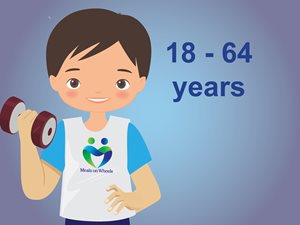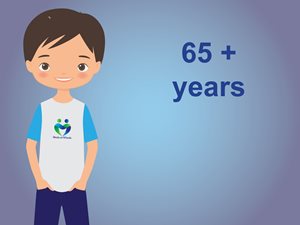Physical Activity

Being physically active has health and wellbeing benefits for people of all ages. How much exercise is recommended changes according to how old we are. For example children and young people should aim for an hour a day of moderate to vigorous physical activity, whereas older adults over 65 years of age are recommended to do 30 minutes a day of moderate intensity exercise.
Physical activity comes in many forms – it is anything which gets your body moving, makes your heart beat a bit harder, and makes you breathe faster. This might be something at home like mowing the lawn or cleaning the house, or it could be a structured activity like sport. It might even be something you do every day like walk to the bus stop or walk to school or work.
Being physically active also has benefits on wellbeing.
This is because exercise releases chemicals like serotonin and endorphins that improve your mood.
Exercise also helps you to think more clearly by pumping blood to the brain. It also improves memory – regular exercise can increase the size of the part of the brain responsible for memory.
Physical activity is important as we get older too – it can help prevent some of the health problems that come with age, and helps to maintain muscle strength, balance and independence with activities.
Older adults who eat well and exercise regularly are more often able to stay living at home independently.
Meals on Wheels meals that comply with the
National Meal Guidelines provide nutritionally balanced meals that meet the energy and protein needs of older adults and can assist with maintaining good nutritional status, and thus keeping people living in their own homes for longer.
Exercise recommended for children and young people (5 to 17 years)

Recommend child and young people do at least 60 minutes each day of moderate to vigorous physical activity. This doesn’t have to be a 60 minute session at once it can be several shorter sessions throughout the day.
As part of the 60 minutes of daily activity, we recommend children and young people include muscle and bone strengthening activities 3 days per week.
Moderate to vigorous physical can include:
Football, basketball, netball, bike riding, swimming and dancing.
Muscle-strengthening activities can include:
Running climbing, swinging on monkey bars, sit-ups, push-ups and yoga.
Light physical activity activities can include:
Walking to school, walking the dog, going to the park with friends and helping around the house.
Exercises recommended for adults (18 to 64 years)

Each week it is recommended that adults should either do:
· 2.5 to 5 hours of moderate intensity physical activity including swimming, mowing the lawn, brisk walking and golf.
· 1.25 to 2.5 hours of vigorous intensity physical activity including jogging, fast cycling and team sports such as soccer or netball.
Exercises recommended for older Australians (65 years and over)

It is recommended to strengthen bones and muscles older Australians aged 65 and older should participate in strength activities 2 times a week.
Moderate Exercise is beneficial for your heart, lungs and blood vessels. Moderate exercise include:
Brisk walking, swimming, golf with no cart, aerobics or water aerobics, yard and garden work, tennis, mopping and vacuuming.
Strength Activities can help you maintain muscle and bone strength. Strength exercises can include:
Weight, strength or resistance training, lifting and carrying for example groceries or small children, climbing stair and moderate yard work such as digging and shifting soil.
Flexibility Activities can help you move easier. Flexible activities can include:
Tai chi, bowls either indoor or outdoor, yoga, dancing, stretching exercises, mopping and vacuuming.
Balancing Activities can prevent falls and injuries. Balancing activities can include:
Side leg raises, half squats and heel raises.
Meals on Wheels meals that comply with the National Meal Guidelines provide nutritionally balanced meals that meet the energy and protein needs of older adults and can assist with maintaining good nutritional status.
Keeping people living in their own homes for longer.